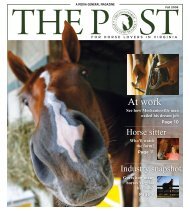What this Chesapeake horseman can teach you - Virginia Horse ...
What this Chesapeake horseman can teach you - Virginia Horse ...
What this Chesapeake horseman can teach you - Virginia Horse ...
You also want an ePaper? Increase the reach of your titles
YUMPU automatically turns print PDFs into web optimized ePapers that Google loves.
Fall 2009<br />
5 ON THE COVER<br />
Mounted police oFFicer<br />
<strong>Chesapeake</strong> resident patrols <strong>Virginia</strong> Beach<br />
Amy Bailey at a special function at the mounted police facility.<br />
By Andy Taylor<br />
Waves crashing onto the shore, gulls squawking<br />
overhead, the occasional shrill from a lifeguard’s whistle<br />
and horses clop, clop, clopping.<br />
Aah, the summer sounds of the beach.<br />
<strong>Horse</strong>s clopping? That’s right, Amy Bailey aboard<br />
Nightwatch, and other mounted police officers, patrol the<br />
<strong>Virginia</strong> Beach oceanfront and resort area on a nightly basis.<br />
Bailey is a master police officer with the <strong>Virginia</strong> Beach<br />
Police Department and one of 14 officers and 16 horses in<br />
the mounted patrol unit.<br />
Her horse, Nightwatch, is a dark-bay Thoroughbred<br />
gelding, standing 16 hands high. He was on the show<br />
jumping circuit before he was given to the police<br />
department. All of the horses in the mounted patrol are<br />
donated, Bailey said.<br />
Nightwatch and Bailey work the 6 p.m. to 4 a.m. shift<br />
during the summer months. Bailey said their mission is to<br />
provide a visible presence and to look for trouble before<br />
it happens.<br />
Bailey said officers on horseback are in a better position<br />
to see problems brewing because they sit high above the<br />
crowd. This gives them an edge that officers on foot or in<br />
patrol cars don’t have, she said.<br />
Photo courtesy of Linda House/Foxwoodphotography.com<br />
“On horseback <strong>you</strong> are able to see stuff start to develop<br />
before it happens,” she said. “I <strong>can</strong> see a group of people<br />
starting to make trouble from a block or two away.<br />
Sometimes it’s gang activity and sometimes it’s jerks, call<br />
it what <strong>you</strong> will.”<br />
A lot of what the mounted police squad does is crowd<br />
control but the evenings are often consumed with arresting<br />
people for being drunk in public, fighting, disturbing the<br />
peace and traffic enforcement, she said.<br />
Best part of the job: Riding my horse anywhere I want.<br />
Worst part of the job: Having to deal with arrogant,<br />
rude people.<br />
It’s a delicate balance when patrolling by horseback,<br />
Bailey said.<br />
“You <strong>can</strong>’t become a spectacle.” By that she means <strong>you</strong><br />
<strong>can</strong>’t go trotting up to every situation <strong>you</strong> see because<br />
when the horses speed up it gets people’s attention and<br />
draws a crowd.<br />
Bailey finds 16-year-old Nightwatch perfectly suited to<br />
the beat he works.<br />
“Put him in the median and he’s just as chilled as he <strong>can</strong><br />
be,” Bailey said. “Put him on a trail ride and everything<br />
spooks him, any little noise like a branch snapping.<br />
“Maybe that says something about the rider,” jokes<br />
Bailey, who never rode before joining the mounted patrol<br />
unit in 1997. She stayed in the unit for five years but<br />
decided she needed to get more experience in other areas<br />
of policing.<br />
So she tried other police jobs in the department.<br />
But she found she missed working with the horses and<br />
after three years she returned to mounted patrol.<br />
There is a strenuous selection process to get into the<br />
mounted unit, Bailey said. A selection board determines if<br />
an officer is a good <strong>can</strong>didate. There is an agility test for<br />
officers and months of horseback training, she said.<br />
Bailey said that on average she’s in the saddle four or<br />
five hours a night, but there are times when it’s as many<br />
as 10 hours.<br />
Bailey said that the officers check their horses each day<br />
to make sure the animal looks good and doesn’t have any<br />
obvious injuries. Officers also do basic maintenance such<br />
as cleaning stalls. And the unit also has a full-time groom<br />
for the horses.<br />
An animal lover, Bailey has three dogs and numerous<br />
fish but has never owned a horse even though she grew<br />
up on a farm.<br />
“We had cows, no horses,” Bailey said. “<strong>Horse</strong>s were<br />
for rich people.”<br />
▪The Post welcomes feedback and story ideas. To contact us, e-mail Joan<br />
Hughes at jchruby@msn.com or call (804) 512-4373.<br />
more on amy baIley<br />
born: 1965, Lynchburg.<br />
residence: <strong>Chesapeake</strong>.<br />
Family: Boyfriend, David.<br />
Pets: Bulldogs Norton and Buster and deaf<br />
pit-bull mix from the local shelter, Dixon; lots of<br />
tropical fish.<br />
occupation: Mounted police officer.<br />
Hobbies: Kayaking, gardening, cooking, auctions.<br />
<strong>Horse</strong> highlight: Participating in the inaugural<br />
parade for President George W. Bush, 2001, and<br />
assisting in security detail for Queen Elizabeth in<br />
Williamsburg, 2007.<br />
Philosophy on life: Life is always better with a<br />
dog by <strong>you</strong>r side.<br />
best horse advice ever received: Ask nice the first<br />
time . . .<br />
www.horsenation.us



